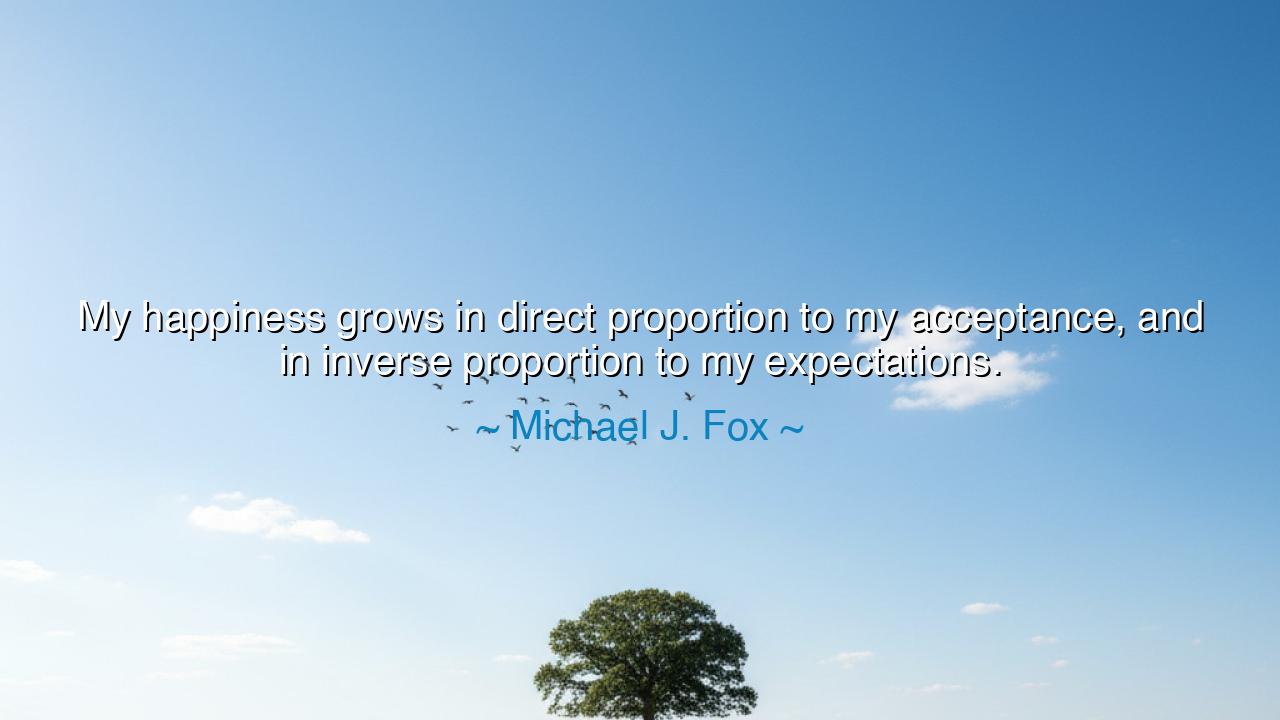
My happiness grows in direct proportion to my acceptance, and in
My happiness grows in direct proportion to my acceptance, and in inverse proportion to my expectations.






“My happiness grows in direct proportion to my acceptance, and in inverse proportion to my expectations.” Thus spoke Michael J. Fox, a man whose life, marked by triumph and trial, became a testament to the strength of the human spirit. In these words lies a profound truth — that happiness is not a treasure found in the fulfillment of every desire, but in the calm acceptance of what is. The more one embraces reality with peace, the more one’s joy expands; yet the higher one’s expectations rise — the tighter one tries to control life — the more suffering takes root. To live wisely, then, is not to demand that the world conform to our wishes, but to open the heart to the gifts hidden within imperfection.
The origin of this wisdom flows directly from Fox’s own journey. Beloved by millions for his roles in Back to the Future and Family Ties, he was struck in his youth by a cruel twist of fate: the early onset of Parkinson’s disease. At first, it was a sentence that seemed to strip away his dreams — his health, his career, his certainty. But in the crucible of suffering, he discovered something far greater: the power of acceptance. He learned that joy could still exist — not by denying his condition, nor by clinging to the past, but by finding grace in the life he still possessed. His happiness, as he said, grew only when he stopped demanding more and started appreciating what already was.
To accept is not to surrender, nor is it to yield to despair. It is to stand firm before life as it is, unclouded by the storm of what should be. Many souls are torn by expectation — by dreams of perfection, by the hunger for control, by the belief that peace lies somewhere ahead, just beyond the next achievement or possession. But expectation, when untamed, becomes a chain around the heart, dragging it from the present moment. Acceptance, on the other hand, is liberation. It is the quiet strength that says: Even this is enough. Even here, I can find light.
The ancients too knew this truth. Epictetus, the Stoic philosopher, taught that men are disturbed not by things, but by their opinions about things. He lived in poverty and slavery, yet found peace greater than that of kings, for he had learned to desire only what was within his control — his own mind and actions. His happiness grew, like Fox’s, not from luxury or fortune, but from the serenity that follows acceptance. To the Stoic, as to the modern sage, peace is not found by reshaping the world, but by reshaping one’s heart to meet it.
History bears witness to this same law. Consider Helen Keller, who, blinded and deafened by illness, might have lived a life of sorrow. Yet she found her purpose not through expectation, but through acceptance — of her condition, of her struggle, and of the possibilities still before her. She once said, “I thank God for my handicaps, for through them I found myself, my work, and my God.” Her happiness did not grow by expecting life to return what was lost, but by embracing what was given. Through that acceptance, she transcended limitation and became an inspiration to the world.
There is courage in such peace. To practice acceptance is not passive resignation, but active strength. It is to face life with open eyes and say: “This is my path, and I will walk it fully.” It demands humility, for we must admit that not all things are ours to command. It demands patience, for joy blooms slowly in the soil of surrender. Yet when one learns this art, one finds freedom — for every disappointment becomes a teacher, every hardship a companion, and every moment an opportunity for grace. Expectations, once lowered, do not diminish life; they illuminate it.
Therefore, my children, take these words of Michael J. Fox into your hearts: “My happiness grows in direct proportion to my acceptance, and in inverse proportion to my expectations.” Seek not to mold the world to your will, but to shape your will to the rhythm of the world. Accept what cannot be changed; work with courage on what can. When life withholds what you desire, do not curse it — seek instead the hidden blessing it offers. Let go of the tyranny of expectation, and happiness will come quietly, like sunlight after rain.
And remember this truth: acceptance is not weakness, but wisdom. The river that flows bends around the rocks, yet reaches the sea all the same. So too must your spirit flow — flexible, patient, and enduring. For happiness, like peace, does not come to those who grasp, but to those who open their hands.






AAdministratorAdministrator
Welcome, honored guests. Please leave a comment, we will respond soon